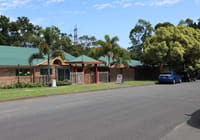
New tax laws no silver bullet for build-to-rent, NAB warns
National Australia Bank has warned new laws that cut tax rates for foreign investors in build-to-rent housing are no silver bullet fix and will do little to overcome roadblocks such as high state taxes and construction costs.
While last week’s legislation halving the impost for offshore investors was “definitely positive”, it was not enough by itself to draw more foreign capital into the sector, NAB chief executive Andrew Irvine told The Australian Financial Review.

“There’s more that needs to be done to do that,” Mr Irvine said after the opening of the Local Kensington build-to-rent project in Melbourne on Wednesday.
“We’ve got to get more viability in projects because costs are still too high, planning is still too long and taxes need to be worked on. There’s still too much local taxation, state-based taxation.”
NAB and rival Macquarie-backed developer Local’s newly completed $380 million, 477-unit, build-to-rent project opened in Melbourne’s Kensington on Wednesday, a week after the new laws put the tax for foreign investors on par with Australia-based investors at 15 per cent.
Mr Irvine’s position put NAB at odds with Macquarie, where Asia-Pacific head of real estate James Kemp said the new rules were beneficial.
“It overarchingly should improve the ability to attract foreign capital,” Mr Kemp told the Financial Review on the sidelines of the event.
“That’s because you’ve seen a situation where foreign capital is familiar with the build-to-rent product in a lot of other established markets globally and the managed investment trust legislation provides stability and aligns investment to build-to-rent like every other commercial asset class.”

Standing in the way
But even Mr Kemp said several factors would affect the volume of build-to-rent projects coming out of the ground, particularly the prices build-to-rent developers paid for sites and how much longer build-to-sell apartment developers chose to sell sites they’d previously acquired before deciding the market had strengthened enough to develop them themselves.
Investment settings have been a drag on Australia’s build-to-rent pipeline, planning consultancy Urbis said in its latest report on the growing sector. Only 32 per cent of the country’s 56,600-apartment pipeline has secured funding to date.
“News that the BTR bill has been passed in parliament last week is expected to unlock more activity, with global investors now able to access the reduced tax rate on BTR assets held in a managed investment trust,” the Urbis Apartment Essentials report said.
“Time will tell if halving the tax can double the BTR pipeline, but it is an important step in providing certainty to initial investors as the sector builds scale.”
Build-to-rent housing accounted for just 0.2 per cent of Australia’s property market, in contrast to the US, where it made up 12 per cent and this created an “immense” opportunity, Mr Irvine said.
The expanding world of commercially managed rental accommodation includes both market-rate rental housing and subsidised housing and the Local project also houses 11 social homes for low-income renters relying on social security, 22 affordable housing units rented at below-market rates and nine specialist disability accommodation units.
NAB, which provided undisclosed debt finance to the Local project, had already lent $4.4 billion of the $6 billion it intends to lend towards affordable and specialised rental housing by 2029, Mr Irvine said.
Growing focus
Macquarie chief executive Shemara Wikramanayake said the so-called living sector was a growing area of focus for the bank both in Australia and more widely.
“We have 10 specialist partnerships around the world, six of them in this living area where we’re doing a whole lot of things like manufactured housing, land lease, land subdivision and retirement offerings,” Ms Wikramanayake said.
The new project at 348 Macaulay Road is the first of three planned developments by Local, which former senior Grocon figures Dan McLennan and Matthew Berg founded in 2021. Macquarie Asset Management holds a majority shareholding in Local – through its Macquarie Asia Pacific Real Estate Partnership fund – and also provided the majority of equity funding for the Kensington project.
Local co-chief executive Mr McLennan said the biggest benefit of reducing tax for foreign investors was that it would draw more local investors in.
“Arguably, the most significant change and benefit, is providing liquidity for domestic investors,” he told the Financial Review.
“A key barrier for domestic funds has been, what’s the liquidity? What are the long-term prospects of the sector? If I invest in an asset and I need to sell, who can I sell to? Taking away or reducing the tax just opens up the investing universe for the asset class, and that’s going to certainly bring a lot more confidence, and I think a lot more investment.”











